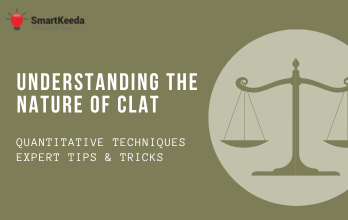
However many students face challenges due to their limited exposure to the legal field. And, to address these concerns, we offer comprehensive guidance and insights in today's blog. We aim to provide CLAT 2025 Strategies for Non-Law Background and assist those non-law background students who aspire to take the CLAT 2025 examination. We present a set of strategies to equip you with the tools and knowledge needed not only to dispel doubts but also to enhance your preparation and achieve desired results.
In this blog, we delve into these meticulously designed strategies, bridging the gap for non-law background aspirants facing the challenges of CLAT. Our recommendations empower you to approach the examination with confidence, maximizing your chances of success in this crucial step toward your legal aspirations.
Why CLAT 2025 is important for non-law background students
By actively participating in the preparation process and dedicating themselves to the task at hand, CLAT 2025 aspirants can transcend any potential hurdles posed by their non-law backgrounds and position themselves favorably in the competitive landscape of law school admissions.
In this way, CLAT 2025 serves as a gateway to realizing dreams and aspirations, offering a level playing field to individuals from all academic backgrounds who aspire to pursue a legal career.
CLAT Exam Format and Sections
Syllabus Overview:
Legal Reasoning: This section places a significant focus on topics such as contract law, criminal law, international law, family law, constitutional law, and the development of legal principles. Moreover, landmark historical judgments are integral components of this segment.
Logical Reasoning: Here, candidates can expect passage-based questions predominantly centered on critical and analytical reasoning. This section tests your ability to critically evaluate and deduce conclusions from the provided information.
English Language: In the English section, your reading and comprehension skills are subjected to rigorous examination. This segment assesses your ability to understand and interpret written material effectively.
Quantitative Techniques: The quantitative techniques section emphasizes data interpretation and various arithmetic topics. Candidates are expected to demonstrate proficiency in solving mathematical problems and interpreting data accurately.
GK (General Knowledge): In the GK section, questions revolve around current affairs and related static GK topics. This segment evaluates your awareness of current events and knowledge of static general knowledge subjects.
By actively engaging with these sections and mastering the key areas within them, CLAT aspirants can enhance their chances of success in the examination. It is crucial to approach each section diligently, focusing on the specific topics outlined here to excel in the CLAT exam.
Challenges Faced by Non-Law Background Students :
However, to overcome this challenge effectively, it is essential to construct a robust foundation in legal concepts. It is crucial to keep in mind that the CLAT exam encompasses four additional sections apart from legal reasoning. Consequently, everyone has an equal opportunity to excel in CLAT 2025. Success hinges on your diligence, smart strategies, profound subject knowledge, and your approach and mindset toward the examination.
Study Materials and Resources:
For those enrolled in coaching institutes, it is advisable to utilize the materials provided by these institutions, ensuring that the content is both updated and directly applicable to the exam. However, for individuals pursuing self-study, the following book recommendations are highly recommended:
Logical Reasoning: "Analytical Reasoning" by M. K. Pandey
Legal Reasoning: "Legal Aptitude and Legal Reasoning" by AP Bhardwaj
Quantitative Techniques: "Elementary Mathematics with Numerical Ability" by Prateek Jain
In the English language, the development of your reading and comprehension skills is pivotal. To excel in this area, immerse yourself in extensive reading across a wide array of topics. Newspapers and novels serve as invaluable resources.
For General Knowledge, consider referring to "LawEx," a bimonthly magazine, and make use of the "CA mock drill" offered by Smartkeeda.
It is essential to combine these recommended study materials with the regular practice of mock tests. Mock tests play a crucial role in your exam preparation, aiding in the enhancement of your speed, accuracy, and time management skills. Therefore, it is imperative to include them as an integral part of your study schedule.
Legal Aptitude and Logical Reasoning:
To excel in these areas, it is crucial to nurture essential skills, including problem-solving, as well as the ability to comprehend and analyze legal arguments. Furthermore, achieving proficiency in legal reasoning necessitates the development of a deep understanding of common legal concepts.
English and Comprehension:
- Diverse Reading
- Contextual Understanding
- Building a Strong Vocabulary
- Grammar Improvement
- Solving Reading Comprehension
- Practice through Mock Test
Mathematics and General Knowledge:
In Current Affairs, maintaining up-to-date knowledge daily proves invaluable. This approach not only lightens the burden but also prevents information overload in the final stages of exam preparation. Leveraging dedicated GK resources tailored for the CLAT exam, such as Smartkeeda's CLAT mock drill and the LawEx bimonthly CA magazine, will fortify your grasp of current affairs, ensuring you are well-prepared for this critical component of the examination.
Solving Previous Year Papers:
Moreover, the recognition of the pivotal role played by the process of learning from one's mistakes cannot be understated. Herein lies the paramount importance of prioritizing mock tests as a fundamental component of your preparation.
These assessments offer you the opportunity to actively evaluate your performance, systematically identifying your strengths and weaknesses. Additionally, they serve as a dynamic tool for continuously monitoring your progress. The cultivation of a mindset that consistently seeks growth and improvement through the lens of self-correction becomes an indispensable aspect of your pursuit of excellence.
Last-Minute Preparation Tips:
Revision Strategies:
- Prioritize essential topics.
- Review key subjects thoroughly.
- Revise your notes diligently.
- Strengthen weak areas.
- Read recent GK highlights.
- Practice past year papers.
- Refine exam strategies.
- Maintain a calm mindset.
- Manage time effectively.
On exam day, consider these essentials:
- Bring your admit card.
- Carry ID proof and a copy.
- Pack necessary stationery.
- Bring a clear water bottle.
- Review admit card instructions.
- Arrive at the center early.
- Maintain a calm, positive mindset.
Conclusion:
To realize this goal, strictly follow the guidance and implement the strategies meticulously. Diligence and unwavering commitment are key. Your dedication will propel you to a top position in the CLAT 2025 results. We extend our sincere wishes for your success in the upcoming CLAT 2025 examination. Best of luck!

Author : Amrish
Hi, this is Amrish, an Assistant Manager in one of the largest private banks with an extensive background in the banking industry. Having post-graduated with honors in Finance from a renowned university, I embarked on a rewarding career in the financial services industry. With a deep understanding of their unique needs and goals for banking exams, I would love to help aspirants through my blogs. I will keep sharing insights for cracking various exams by providing tips, strategies, mistakes one should avoid, the best resources, and much more. God Speed to all aspirants!
FAQ’s
Non-law background students encounter significant challenges in their CLAT preparation, primarily stemming from their limited exposure to legal matters, legal terminology, and the historical legal context.
To create an effective study schedule for CLAT preparation, prioritize topics and subjects, and incorporate activities such as concept-building mock tests and practice question solving into your routine.
For CLAT preparation, the best resources at your disposal are the study materials provided by coaching institutes and reputable books available in the market.
Effective study strategies for CLAT, especially for non-law background students, involve increasing exposure to legal issues and legal terminology while also placing special emphasis on legal reasoning and practicing questions based on it.
To enhance your legal aptitude and logical reasoning skills for CLAT, actively develop your critical and analytical thinking abilities. Thoroughly grasp essential legal concepts and clear any doubts surrounding them. Additionally, regular practice through mock tests is vital in achieving improvement.





